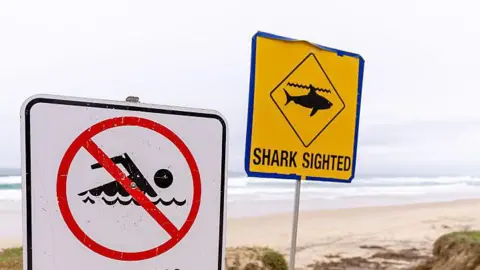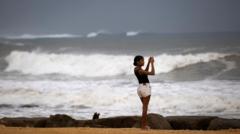A recent incident in Providenciales, Turks and Caicos, has drawn attention to the risks associated with interacting with marine life. A tourist was bitten by a shark while attempting to take photos of it in shallow waters. Following the incident on February 7, she was promptly treated at a local hospital and evacuated from the island for further medical care, as reported by the local government.
Described as approximately six feet long, the species of the shark remains unidentified. The woman reportedly tried to engage with the animal before being bitten. Although the extent of her injuries is still not disclosed, the beach was temporarily closed, reopening a few days later once the shark moved to deeper waters.
Experts note that shark bites are generally rare and often arise from misunderstandings. The International Shark Attack File at the University of Florida recorded 88 confirmed shark bites worldwide last year, with 24 of those being provoked, where human interaction initiated contact with the shark. Notably, one previous case in Turks and Caicos was logged last year, which was not fatal.
Chris Stefanou, a conservationist and shark tagger, expressed that interactions with sharks can lead to confusion, especially when humans use shiny objects like cameras that can be mistaken for smaller fish. Meanwhile, the Royal Bahamas Police Force reported another shark-related incident involving two Americans in Bimini Bay on the same day, raising eyebrows due to the rarity of such events occurring concurrently.
Gavin Naylor, director of the International Shark Attack File, remarked on the unusual occurrence of two bites in one day but was cautious about making any definitive conclusions regarding trends in shark attacks. The overall figure for unprovoked bites has decreased, suggesting the importance of responsible actions when interacting with wildlife.
Described as approximately six feet long, the species of the shark remains unidentified. The woman reportedly tried to engage with the animal before being bitten. Although the extent of her injuries is still not disclosed, the beach was temporarily closed, reopening a few days later once the shark moved to deeper waters.
Experts note that shark bites are generally rare and often arise from misunderstandings. The International Shark Attack File at the University of Florida recorded 88 confirmed shark bites worldwide last year, with 24 of those being provoked, where human interaction initiated contact with the shark. Notably, one previous case in Turks and Caicos was logged last year, which was not fatal.
Chris Stefanou, a conservationist and shark tagger, expressed that interactions with sharks can lead to confusion, especially when humans use shiny objects like cameras that can be mistaken for smaller fish. Meanwhile, the Royal Bahamas Police Force reported another shark-related incident involving two Americans in Bimini Bay on the same day, raising eyebrows due to the rarity of such events occurring concurrently.
Gavin Naylor, director of the International Shark Attack File, remarked on the unusual occurrence of two bites in one day but was cautious about making any definitive conclusions regarding trends in shark attacks. The overall figure for unprovoked bites has decreased, suggesting the importance of responsible actions when interacting with wildlife.




















